What Constitutes (Music History) Core in the (School of Music and) Conservatory Curriculum3/17/2021 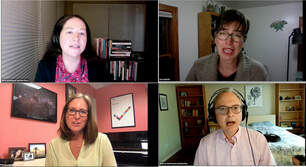
Last November I had the privilege and honor of participating in a roundtable at the 2020 national meeting of the American Musicological Society called "What Constitutes Core in the Conservatory Curriculum?"
The panel was organized by my colleague Erica Scheinberg, and also included my colleagues Sara Haefeli (who has just published a terrific book on writing in the music curriculum) and Melanie Lowe -- with Erica, among the people in our discipline whom I most admire for their pedagogical inventiveness, effectiveness, and creativity. We were joined by several dozen colleagues in the course of the hour-and-a-half session, who made many insightful points and posed many nuanced questions in the chat -- which was evidently saved, but which I cannot unfortunately convey here. The video of our session was recorded by the AMS, and I am grateful that I can share it with you below with the permission of our Society and of my three colleagues. With the help of those in attendance at our session, we discussed a number of pressing issues connected to music history "core" courses within the curriculum of "conservatory-style" Schools of Music in the USA -- the kinds of institutions where each of us teaches. I encourage those who are interested in the topic to watch the entire video, linked below, since there were many more useful observations; a transcript is available below the video. Captions can be toggled on and off by clicking on the "cc" box in the Panopto video. I'll convey below the video...
... some of the insights raised by my colleagues that I personally found most interesting and fruitful:
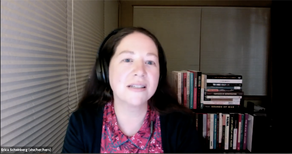
Erica Scheinberg:
19:14 - "[T]here is this alternative experience where if students just let go of an idea, that a course has a linear order, then they're much more creative in their thinking, they're much more playful with connections. And the point isn't all music is the same. And so we can draw connections between everything. It's not about universalism, it's about viewing this case study through some of the more theoretical or conceptual lenses that we've already applied to this radically different thing. De-emphasizing the content and really emphasizing the bigger ideas." 34:26 - "[We should consider] whether or not it is actually important if the Canon is positioned as the core thing that students are supposed to learn before they go on to do anything else, versus the Canon being something that is worthwhile studying, maybe not for all students. Maybe not all students need to study the Canon before they can go do anything else. How might core courses that focus on Classical music function as kind of gatekeeping courses, you know, who do our core courses and power or exclude if they're, if they are focused on the Canon, no matter how we're critiquing or deconstructing these ideologies and narratives?" 53:15 - "I do assign daily writing assignments, but it's all informal writing. And I read them and I give the students feedback, although I'm doing an ungrading thing this year. So it's just -- you did it or you didn't do it, which is been great. ... Writing as a way of developing ideas, gosh, I see such a difference over two terms of how students are using writing to think -- we say, think to a new place for you, think beyond what you know. And so writing can be actually a tool that empowers students so much, and gives them things to say and lets them develop their ideas. " 1:14:29 - "[In the culture of a conservatory] there's students who are interacting with teachers who are really positioned as authorities over their interpretation of the pieces that they're working on ... that dynamic is there to such an extent that students often bring it into the classroom and it's really nice to dismantle that in any way that we can, In a spirit of respect, also." 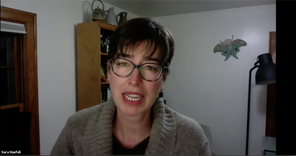
Sara Haefeli:
12:52 - "We at Ithaca College have really been thinking about what is it that we want the students to be able to know and do at the end of their four years? And, and this idea of musicological thinking, just like, you know, Erica, your classes; Andrew, what you were doing; Melanie, what you were doing -- what we're all trying to move toward, is more about the skills of critical inquiry, skills of media literacy. And having those basic, the core classes, really teaching those ways and those skills and especially the ability to pose a musicological question, and start to be able to find out an answer to that question, is really core for us. And then what becomes elective or non core becomes more and more content oriented, and less skill oriented, so to speak. And that way, we really try to avoid the hierarchical Western white male Canon and the rest." 24:40 - "Our School of Music mission is to transform the human condition through the art and practice of music. And so we've been, you know, we've really taken that to heart -- What does it mean to transform the human condition? And for me, it meant not only changing the curriculum of the class, but changing the assessment practices as well. So my course is now designed by the principles of Universal Design so that students don't need any accommodations. Such as, you know, extra time for tests or extra time for assignments, because the courses already designed so that students can be working from areas of strength. They work collaboratively and collectively, they are not assessed in in any kind of outside arbitrary way. And that has been really transformational. And, and I think the collaborative work methods in the class have mirrored what we do as musicians, collectively and collaboratively as we're working as musicians in the world." 54:19 - "[O]ne of the things that my book that I shamelessly plugged in the chat tries to lay out is explicitly describing what it means to articulate a musicological question. How do we gather sources? How do we analyze and interpret sources? How do we draw conclusions? How do we articulate what they mean? So breaking down each one of those steps, instead of just assuming that students know how to write, because most of us learned how to write by just, you know, kind of being thrown into the deep end of the pool, and we read a lot, so we could do it. But we can't assume, especially for English language learners, that they're just going to tacitly have those skills when they come into the class. So I explicitly teach reading skills, and I explicitly teach all of those writing skills. And like Melanie, I think that writing can come in a lot of different forms. And like Andrew, I'm no longer expecting that they all can do it in the same way." 1:19:17 - "[W]hen we went online in March and the pandemic, the one thing that really saved my class was that small group work, so those ... groups of four or five students ... have become incredibly close. So that's not a whole cohort, like a sophomore class. But the fact that they're all working in small groups, and they all have that small group experience has kind of replaced the idea of the, you know, what really was almost like hazing with the survey course." 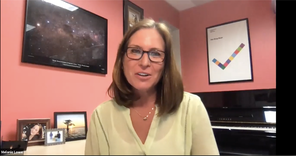
Melanie Lowe:
14:45 - "when you inspire the students to become curious, then very often, they can kind of take the lead and determine what skill set they need to answer the question they are curious about. And then our job becomes making sure that they are equipped with those skills. And they're going to be individual and they're going to be unique -- to the student to the situation to the context of the music. So to me curiosity, and fostering that, is sitting on top of all of it." 35:19 - "I'm teaching a course called the string quartet. And I'll be really honest. And I offered that to the string department when we launched our curriculum as kind of a peace offering. As our -- This is the central plank in our compromise. I will teach a string quartet class, and it will be like, right down the middle heart of the Canon. Here's the interesting thing. 12 years later, I'm still teaching this course every other year or so, and this year, I have no string players in the course, I have a singer, I have a trumpet player, I have a pianist and two saxophone majors. And just last week, they played a transcription of Dvorak's American quartet for us. First time I've heard live music since February, in our hall, 10 feet apart in masks. And it ... so it ended up like the second half of my class became this discussion of what does the string quartet mean, in 2020, in the current cultural context, with these instruments with the COVID, the whole thing just kind of turned into something that I totally did not expect. And it was largely student driven. They just came and said, Can we play this music? And I said, Sure, let's do it. And all that to say it kind of -- something that right might seem right down the middle of what would constitute core, all of a sudden, still is core, but not the way I think any of us expected to define it." 52:18 - "I think it's important that we don't have a monolithic conception of what writing is, there isn't just one type of writing for one type of purpose. And I think so, you know, we were all trained, you know, midterm / final / research paper. So I think we think of writing -- Oh, they don't know how to write, they can't write the research paper, well, maybe they can't, but you know, they're writing really, really great blogs, they're writing doing great like brain dumps on Instagram, I know that that might not be what *we* think of as writing. But if you think about writing is basically to communicate in .. you know, like this, they're actually pretty good at it in certain fora, and they're not so good at it in others, but I think it's just important to empower where their writing strengths are, even if there aren't what we traditionally value as good writing. And then that can actually kind of be an ego boost, and then all of a sudden, they're loosened up. And they're not so intimidated by a more formal writing project, because we validated that they actually do know how to throw words around in other ways." 1:13:47 - "[A]cknowledging and valuing, validating that our students have expertise in areas that we don't. I see a really great way of kind of leveling a little bit the obvious power differential that is still in place, despite whatever we try to do to maybe make it a safe trusting space, there is always going to be that power differential. And when we acknowledge that our students have expertise in areas that we don't, I just find that I can learn from them. And it makes it easier for them to learn from me. And it becomes more of a conversation and a collaborative process than the more sort of top down, you know, giving of information that I'm the expert in." 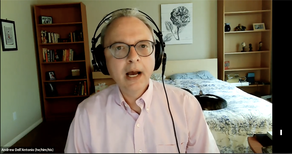
Andrew Dell'Antonio:
29:38 - "Starting this year, I've started actually putting the Western chronology in second place and having the initial assignment before each session, being something that is not, in fact, canonic or chronological or "great-composer-ly". ... And that has worked to decenter things rather well. And it's also created this idea of -- Wait a second, what is "the story"? And I can at that point, say, there is no "the story." There is no "the chronology," there are many different ways of thinking about time. ... [U]ntil you give [students] the opportunity, and the chance to experiment and try and see what happens when you try to create a story that isn't "The Story," then they'll be stuck in the story that we were handed that we now realize was insufficient for us. I think." 39:54 - "I think it's a legitimate thing to think about skill sets. And Sara has talked about this, you know, it's sort of like playing the violin. Absolutely, there are a lot of different ways that you can play the violin and a lot of different techniques you can develop. And there may not even be one set of techniques that everybody should learn. But there should be some techniques that should be available for people to learn, they should be evolving, but we should be able to articulate what they are. And to articulate to students, you should be taking courses that are helping you learn these skills, and we are going to provide those, because in a way, if we don't do that, then we're not giving students tools." 48:24 - "Every single one of my students has a different level of preparation, language writing skills. And I gave up a while ago trying to measure them against a same standard, because, first of all, I don't know how to do that. ... I write okay, maybe, but I don't know how to teach writing particularly well. So again, I mentioned earlier that I draw on the writing center of my University, but I found it really helpful just to give opportunities for process. Now I'm privileged in that there are graduate students who work with me who are phenomenally helpful in helping to nudge process along, but none of us really intervene very strongly in the language ability. We just ask students to keep trying and keep writing and try again; sometimes revising, sometimes writing very short things, because as we all know, the way you learn is by doing -- you read, you write, you read, you write and eventually your skills build... one hopes, the level that you need." 1:17:21 - "I've also been doing a fair amount of ungrading in my class this semester. And there still is a paper trail of the work that students do if you want to follow it. ... And exactly as Sara said, several times students will give themselves less credit than they deserve. And sometimes a student will have verifiably done no work, or very little work and have given themselves full points. And so I say, Tell me why, convince me that the fact that you did two thirds or half is actually as much as you could do, because in some cases, it's all they could do. And then I'm willing to listen, because it's their circumstance. So I mean, there are ways to create accountability. And I think Erica, your point is -- everybody I've read and have tried to learn from about ungrading says, that is exactly what you do, instead of giving grades you give feedback. Because feedback is crucial, right? We learn from feedback. But as Sara says, feedback that points out what you did wrong, is not going to help you get better. I mean, some of us ... have learned to deal with getting what we can out of feedback about what we did wrong. But that is ultimately, verifiably bad. You know, those of us who have been in administration and have read stuff about supervising have learned that telling your supervisee what they've done wrong is exactly the wrong way to help them get better, exactly the wrong way. ... So why should it be different with students?"
Before the session, each of us posted a short video and provided a handout with some information about the curricular issues we were planning to discuss as reflected in our own programs; my video is available here, and my handout is available here. Please contact my colleagues directly to obtain information or to pose follow-up questions:
If you wish to contact me with questions, please use the contact area on this web site.
1 Comment
Richard Miller
3/21/2021 02:08:14 pm
Thanks, Andrew--and everyone--for posting this. Very very helpful as we all work to reimagine music school.
Reply
Your comment will be posted after it is approved.
Leave a Reply. |
Reflections on equity and justice in pedagogy, music, disabilityCategories
All
Archives |
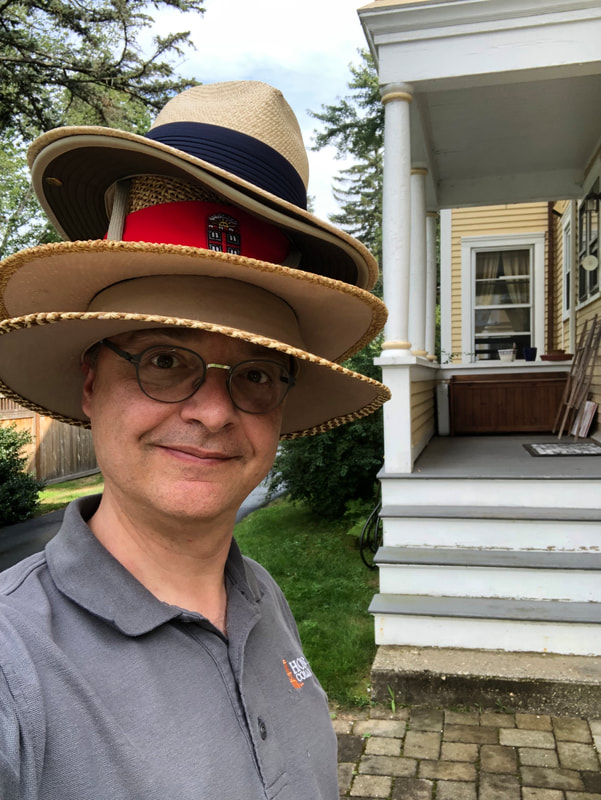
 RSS Feed
RSS Feed